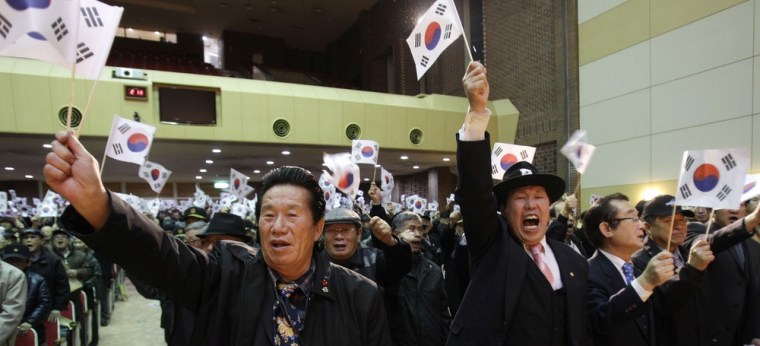South Korean lawmakers slammed the government Thursday over revelations the country's spies failed to take seriously intelligence from August that indicated North Korea might attack a front-line island.
South Korean spy chief Won Sei-hoon's surprise acknowledgment of the intelligence breakdown came a week after the North rained artillery shells on that island, Yeonpyeong, a tiny enclave of civilians and military bases located near a disputed maritime border that has long been the focus of North Korean anger and violence.
Four South Koreans — two marines and two civilians — died, and South Korean President Lee Myung-bak, facing strong criticism, has since replaced his defense minister and vowed to bolster troops in the area.
Won told lawmakers in a private briefing Wednesday that South Korea had intercepted North Korean military communications in August that indicated Pyongyang was preparing to attack Yeonpyeong and other front-line islands. Won didn't expect that attack to be on civilian areas and considered it a "routine threat," according to the office of lawmaker Choi Jae-sung who attended the closed-door session.
'System didn't work'
South Korea's main opposition Liberal Democratic Party said Thursday the government had failed to deal with North Korea's artillery barrage, even though it had intelligence on an impending attack.
"Our intelligence system didn't work," Jun Byung-hun, the party's chief policymaker, said, according to a statement.
The National Intelligence Service on Thursday declined to comment.
"It's a clear dereliction of duty by the military and intelligence authorities," the conservative Munhwa Ilbo newspaper said in an editorial Thursday. "It frankly showed the national security system is basically in serious disorder."
South Korea's Joint Chiefs of Staff tried to play down Won's comments, saying the intelligence was that North Korea ordered its troops to prepare to return fire should South Korea conduct artillery drills.
That explanation did nothing to cool anger among opposition lawmakers, many of whom were already critical of Lee's handling of the attack.
"The government and its ruling party only churned out anti-North Korea hard-line rhetoric, but they didn't make any preparation," Jun said.
Party floor leader Park Jie-won said even with the world's best weapons, South Korea "cannot guarantee our national security" if intelligence and military authorities aren't capable of analyzing information.
Won also told lawmakers North Korea is likely to strike again. He said the North probably carried out last week's attack in part because it needed a "breakthrough" amid internal dissatisfaction over a plan to transfer power from Kim Jong Il to his youngest son, Kim Jong Un, Choi's office said.
"The artillery attack was part of North Korea's efforts to boost the status and legitimacy of Kim Jong Un," said Atsuhito Isozaki, a North Korea expert at Keio University. "He is too young, with no military credentials. But he is a four-star general, and North Korea had to do something to match his nominal title."
A group of North Korean defectors, meanwhile, condemned the North's barrage at a news conference in Seoul on Thursday. Kang Chol-hwan, a defector-turned-journalist, said South Korea should have fired retaliatory artillery against the North during its joint drills this week with the United States, which ended Wednesday.
"The Lee administration is cowardly. What are they afraid of?" Kang said. "The North Koreans cannot retaliate."
To ease tensions between the Koreas, China has pressed for an emergency meeting in coming days among the six nations who previously negotiated over North Korea's nuclear program — the two Koreas, China, Russia, Japan and the United States.
After walking away from the six-nation talks in April 2009, Pyongyang has shown it is eager to restart them to gain much-needed fuel oil and aid in exchange for nuclear disarmament. But Washington, Tokyo and Seoul are wary of talking with the North, and their top diplomats planned to meet in Washington on Monday to plot a joint strategy on dealing with North Korea.
Seoul says North Korea must show real commitment to disarm. It noted the North has gone in the wrong direction with its revelation last month of a new uranium enrichment facility that would give North Korea a second way to make nuclear bombs.
Yeonpyeong Island was quiet Thursday.
Some residents got off the ferry from the mainland, packed bags at their homes, and then rushed back to catch the return ferry. At one home, a woman swept out broken glass and threw away ruined belongings. Her husband covered windows with sheets of plastic.
Destroyed homes had yellow police tape across the doors, so residents had to duck underneath to get in and out. Several groups searched for stray cats and dogs. Soldiers and marines picked up supplies at the port and loaded them onto trucks.
___
Associated Press writers Kim Kwang-tae and Seulki Kim in Seoul, Shino Yuasa in Tokyo and photographer David Guttenfelder in Yeonpyeong contributed to this report.
